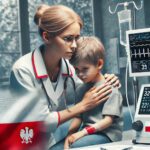Source: WITT, S.; SCHUETT, K.; WIEGAND-GREFE, S.; BOETTCHER, J.; QUITMANN, J. Living with a rare disease – experiences and needs in pediatric patients and their parents. Orphanet Journal of Rare Diseases, [s .l.], v. 18, n. 242, 2023. Available at: https://doi.org/10.1186/s13023-023-02837-9. Accessed on: 28 Feb 2024
👨👩👧👦 Millions of families face the impact of rare diseases, especially in children, requiring attention to their complex psychosocial needs.
- Why it matters: It reveals the urgency of improving psychosocial and medical support for pediatric patients with rare diseases and their families, highlighting the gaps in the current healthcare system.
🧠 What’s going on:
- Rare diseases significantly affect the daily lives of patients and their families, including emotional, financial and social challenges.
- The diagnosis and treatment of these conditions are complex, leading to considerable stress.
🔍 Between the lines:
- Psychosocial support is often underused due to lack of knowledge or access, exacerbating family stress.
- Effective communication and ongoing support from health professionals are crucial to the well-being of families.
🏃 In a nutshell:
- Living with a rare disease brings unique challenges, highlighting the need for adapted and accessible support.
🖼️ The big picture:
The article draws attention to the need for integrated, family-focused approaches to rare disease care, proposing improvements in psychosocial support, accessible information and coordinated care to address the challenges faced by these families.
💭 O ur opinion
Awareness and collective action are essential to meet the complex needs of rare disease patients and their families.
The article in questions and answers
What are some common challenges faced by families dealing with a rare disease diagnosis?
Families dealing with a rare disease diagnosis face several common challenges, including:
- Late diagnosis: The process of diagnosing rare diseases can be long and complex, leading to a prolonged period of uncertainty and suffering for both the child and their family.
- Emotional turmoil: Parents can experience a range of emotions, such as shock, disbelief, anger, guilt, sadness and anxiety when they receive the diagnosis of a rare disease for their child.
- Lack of information and expertise: There is often limited information and expertise available in the medical community about rare diseases, making it difficult for parents to understand the disease, find appropriate medical care and access the necessary resources.
- Financial Burdens: Managing a rare disease can lead to financial difficulties due to the costs associated with medical consultations, treatments and care responsibilities.
- Social isolation: Families may face social isolation due to the unique demands and challenges of managing a rare disease, as well as limited community awareness and support.
- Fragmentation of care: Rare diseases often require multidisciplinary management involving multiple healthcare providers and specialists, making it difficult for parents to coordinate appointments, manage treatment plans and communicate effectively with different healthcare providers .
- Impairments in daily life: Families may experience limitations in their daily lives, including reorganization, changes in family functioning and reduced spontaneity due to the impact of the rare disease and its consequences.
- Stigma and Prejudice: Children with visible manifestations of the disease can face negative comments and social prejudice, leading to withdrawal from public life and feelings of exclusion.
- These challenges highlight the complex and multifaceted nature of managing a rare disease diagnosis in a family context.
How can healthcare providers support families in dealing with the emotional and practical aspects of managing a rare disease?
Healthcare providers can support families in dealing with the emotional and practical aspects of managing a rare disease in the following ways:
- Providing accurate and comprehensive information: Offering detailed information about the disease, its prognosis, available treatments and ongoing research can help parents and patients better understand and cope with the situation .
- Communicating clearly: Using non-technical language, being empathetic and allowing parents to ask questions and express their concerns can facilitate better understanding and emotional support.
- Establishing relationships of trust: Building a relationship of trust and support between healthcare providers and the family is essential for effective communication and emotional support.
- Offering emotional support: Encouraging families to express their emotions and concerns without judgment can help alleviate the emotional distress associated with the diagnosis. Referral to mental health professionals or support groups specializing in rare diseases can provide additional emotional support.
- Supporting siblings: Recognizing the needs of siblings of children living with a rare disease and providing psychosocial support adapted to their needs can help mitigate challenges and promote healthy sibling relationships.
- Coordinating care: Facilitating multidisciplinary management involving various health professionals and specialists to ensure coordinated care and effective communication.
- Providing access to resources: Helping families access needed resources, such as financial assistance programs, support groups and educational materials, can help alleviate some of the practical burdens associated with managing a rare disease .
- Offering Educational Programs: Offering parent education programs and workshops can empower parents to navigate the healthcare system, advocate for their children and make informed decisions about treatment options.
- By addressing the emotional and practical needs of families dealing with rare diseases, healthcare providers can play a crucial role in supporting them in the challenges of managing a rare disease diagnosis.
What are some strategies to improve the general well-being of families affected by rare diseases?
Strategies to improve the general well-being of families affected by rare diseases include:
Comprehensive Psychosocial Support: Providing families with comprehensive psychosocial support, including emotional support, coping mechanisms and access to support groups, can improve their emotional well-being and resilience.
Parent Education Programs: Offering educational programs and workshops to parents can empower them to navigate the healthcare system, advocate for their children and make informed decisions about treatment options, leading to better well-being.
Support for pediatric patients: Implementing supportive interventions for pediatric patients, such as age-appropriate channels of expression, reducing anxiety and promoting psychological resilience, can improve their well-being and overall quality of life.
Sibling Support Programs: Providing psychosocial support tailored to the needs of siblings of children living with a rare disease can mitigate challenges and promote healthy relationships between siblings, improving the overall well-being of the entire family.
Creating safe spaces for communication: Establishing safe spaces for open communication and emotional expression within the family can help family members cope with the emotional impact of the rare disease and promote a sense of belonging.
Promoting community involvement: Encouraging families to get involved with support groups, counseling services and other families facing similar circumstances can create a sense of community, reduce feelings of isolation and provide mutual support.
Empowering families: Equipping families with the knowledge, skills and resources to effectively manage the challenges of caring for a child with a rare disease can improve their ability to cope and improve their overall well-being.
Improving support from healthcare providers: Healthcare providers can improve emotional well-being, enhance coping mechanisms and promote overall family resilience by providing comprehensive support and facilitating access to resources and services.
By implementing these strategies, healthcare providers and support organizations can contribute to improving the overall well-being of families affected by rare diseases and help them face the challenges they face more effectively.
Source: WITT, S.; SCHUETT, K.; WIEGAND-GREFE, S.; BOETTCHER, J.; QUITMANN, J. Living with a rare disease – experiences and needs in pediatric patients and their parents. Orphanet Journal of Rare Diseases, [s .l.], v. 18, n. 242, 2023. Available at: https://doi.org/10.1186/s13023-023-02837-9. Accessed on: 28 Feb 202Font4
Este post também está disponível em: Português (Portuguese (Brazil))






